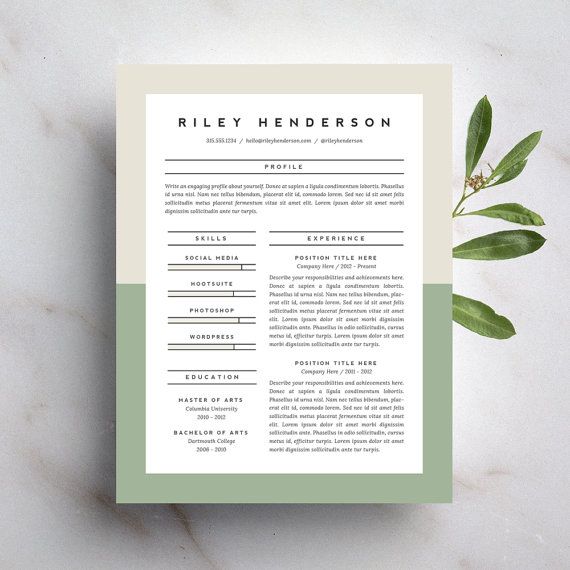CV or resume?
A CV and a resume are in fact two separate types of documents which differ in length, purpose and layout. How to tell them apart and why does one need to know it?
CV
A CV (Curriculum Vitæ, which means “course of life” in Latin) contains highly-detailed information about your achievements and can be over 2 pages long. A CV stays static regardless of the positon you apply to, the difference is only in the cover letter. A CV often contains extra information on hobbies, full work experience and internships, even if irrelevant for some jobs, and information about your high school. For example, your profile on LinkedIn or HeadHunter is an example of a CV. This format is often required for university applications (when a university asks you for an American-type resume, they mean a CV) or job applications in certain countries such as Russia (unlike international companies, most Russian companies still prefer CVs rather than their shorter versions).
Resume
A concise document not longer than 1 page. The goal of a resume is to make an individual stand out from the competition and attract attention within seconds. A resume should be adapted to a certain position and doesn’t have to cover your whole career. Here in Flessibilità we work with resumes, although you will find us using the term ‘CV’ for brevity and convenience just the same.
So, what are the standard resume sections?
Objective/Profile summary (optional)
An introduction in your resume is not obligatory, but it can be useful in certain circumstances:
- When you’re sending your resume without a supporting cover letter and need to provide proof of your motivation. This section can also be useful when showing certain skills, that are otherwise hard to reflect in your resume (ex. Networking).
Examples.
- Experienced in navigating teams through changing business environments.
- Over four years’ counseling experience, working with progressively more challenging cases and more diverse clients.
- Extensive international experience, with a deep understanding of diverse cultural and business practices.
2. When you wish to shift, or expand the scope of your work, to convince the recruiter you are willing to build a career in a certain field other than the one you currently work in (Objective).
Example. An experienced professional wishing to expand her scope of work from finance to project management.
“Looking to build a career in Project or Business Development Management. Have 4 years’ experience in operational and financial analysis. With a skill in project management, I analyse companies on a functional and quantitative basis and recommend process improvements intended to increase company’s net earnings.”
- For university CV yearbooks (require 2 separate sections: Objective and Profile Summary).
Example.
- Recent experience in manufacturing inventory, logistics, and distribution; three years in data analysis; and over six years of diverse business management experience.
- With an MBA degree in corporate finance, I have strong background experience in marketing, business development, and project management.
- For postgraduates who have not had relevant work experience and want to give the employer a general idea of their qualities and strong traits
Example. A senior student with a bachelor’s degree in management and experience in leading a small business in suburban Russia, wishing to build a career in data science.
“A data scientist with 3 years of experience in management and entrepreneurship with a Master’s degree in business analytics and big data from XXX School. Have experience carrying out all aspects of data analysis from data exploration to defending research results. Have a multicultural background, bilingual in English and Russian, with basic knowledge in Spanish.”
- This section is also demanded in some university career centers, countries or professional websites (LinkedIn)
Heading
At Flessibilità we prefer to keep this section short and strictly professional: name, phone number and e-mail for contact. All other information can be highly interesting for the recruiter, but might create unnecessary prejudices or mistaken guesses towards your persona (such as photo or date of birth). If you’re confident they are a win for you then we don’t mind, but don’t count too much on your pretty looks 😉 As for other information such as registration address, driver’s license or readiness for business trips – those are not for a 1-page resume.
Professional Experience
In a resume, there is no place for listing all employment duties as per your working contract. Your job description should be concise and to the point. Therefore, resumes are often result-oriented, containing bullet points of achievements. But results don’t work if your resume does not reflect necessary skills (refer to article ‘Profile of a management consultant’).
Simply stating results does not provide the reader with understanding of:
- why? Why did you target this result in the first place? Was there really a problem? If so, what were the possible negative effects? We can’t always see the benefits of your work if we don’t know the context and cannot evaluate the scale.
- who? Did you work alone or in a team? Who did what and what was your role? This is the biggest problem with stating results without providing context, as we cannot understand if you achieved the result on your own or not.
- how? How did you do it? Was it pure luck, market insight or the result of thorough analytical work? We want to know your logic, structure of your thoughts, the steps you took and the tools you used. There can be so many ways in achieving a result, from developing new software to motivating a sales team and training them to be more effective. Both increase profitability, but the skills are completely different.
To reflect your experience in the best way it should be well-structured and logical. For this, we suggest using the ‘case-role-result’ formula to describe your work experience.
- Case. What was the initial goal/task/problem you had to deal with? It might not always be evident and formulated by your boss. This part can be removed if the result contains information on the initial goal. For example, “decreased costs by 10%” might not be self-explanatory if you had other options which included increasing profitability.
- Role. Knowing what steps you took to achieve an end result, the reader gets a better understanding of your skills and tools. He also gets an understanding of who you worked with and how you achieved the result. This part takes skill, since you need to stay concise, yet point out the key elements of your role.
- Result. Most candidates manage this part, but don’t realize that it is hard to evaluate the result and understand its weight without knowing the role.
Examples of ‘case-role-result’:
- Through model mix planning discovered special model preferences across regions in Russia. Developed new regional strategy that resulted in sales stock decrease on average by 15%.
- Being a member of the cross-functional team, contributed to developing Seasonal Portfolio Strategy. Analyzed trends in Y market and came up with recommendations on brands, product formats and price points for X seasonal portfolio. New strategy boosted performance by 30% in volume sales.
- Led a cross-functional team of R&D, Finance, Commercial, Manufacturing and Logistics associates to launch a new seasonal product. Planned and executed 360-degree communication support for market activation. In the period of product launch, the brand’s market share reached historical maximum.
- Responsible for launch of a new car model in premium segment. Conducted analysis & research to define price corridor to achieve sales & profitability targets; prepared model specifications & option packages; launched dealer motivation program.
Education
State your university (remember about abbreviations), degree and specialization, GPA and thesis, if relevant to a certain job. We don’t mention high school diplomas unless you’re an undergraduate and you’ve been a super achiever in school (ex. got a medal).
- Moscow State Institute of International Relations, MGIMO 2011-2015. MA in Financial Economics, Securities Market and Derivatives, obtained full university scholarship
- IE Business School, Madrid, Spain. Master in Business Analytics & Big Data, GPA 3.8/4.0.Received IE Fellowship among 4 other students in my year.
Extracurricular activities and certificates (optional)
All information that does not fit in the previous 2 sections goes here. This section can also be combined with “Skills” to save more space. The two sections should not take up more than 1/5 of your resume if you’re a professional hire. For postgraduates: don’t forget to mention activities in university which show your soft skills and personality. Examples:
- 4-time champion of Men’s Chess Competition
- MGIMO Debate Club 2011-2013. Organized and supported more than 30 debate meetings; judged and participated in international parliamentary debate tournaments in Riga, Manchester and Moscow.
- Author for the faculty newspaper “Upravlenets (Manager)”, responsible for monthly business literature reviews. Successfully motivated first year students to continue publishing upon my graduation.
Skills (optional)
- Languages. State your level of proficiency (Native/Fluent/Advanced/Upper-Intermediate/etc.). If you have any certificates (TOEFL, IELTS etc.), then indicate your score. Please consider, that consulting companies (and in fact any international company) require an advanced level of English.
- Technical Skills. Stating Microsoft Office as a technical skill is outdated.
Example: Python, R, Tableau, Hadoop, Spark, NoSQL (HBase, MongoDB), SQL, IBM Watson, Tableau & D3.js., Bloomberg, AC Nielsen retail audit, SPSS etc.
- Hobbies and interests. This section is optional and can be indicated if your hobbies are relevant to work, if you reached a professional level or if they reflect your set of skills or personality. It can also show your striving to be the best at whatever you do in any area.



